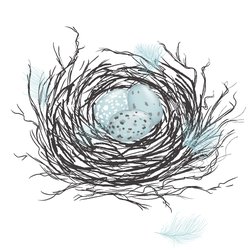
by bsquared5@aol.com | Mar 2, 2016 | Thoughts
Along with a good segment of America, I’ve started to pay attention to Waco, Texas because that’s where Chip and Joanna Gaines host their HGTV show Fixer Upper. Not only are the Gaines’ (as Chip might say) sweeter than candied yams dipped in honey with them big ole pieces of white sugar on ’em and a dadgum cherry on top, but the finished products in the show’s reveals are gorgeous. Like, sometimes jaw-dropping beautiful where the new owners are brought to tears at the thought that they will be living in this actual loveliness.
What I love most about the show, though, is not the vintage, farmhouse style that each of the Gaines’ homes spotlights, but the easy camaraderie of the couple and the sit-on-the-porch-and-have-a-drink vibe that emanates from each house they create. The South is all about place, roots, and home, and Waco rests squarely in that geography.
Southern homes say welcome. As soon as you cross the threshold, you’re liable to be handed a sweating glass of tea or a slice of red velvet cake. The same is true whether you’re at one of those seer-sucker and bowtie events at a Charleston mansion or at Aunt JuJu’s double wide in Hattiesburg, Mississippi. Folks in the South share what they’ve got, from surplus summer-ripe tomatoes to that joy, joy, joy down in their hearts. There’s a reason it’s called Southern hospitality.
For years, we hosted a weekly evening gathering of friends. As the night grew long, we’d put children to bed in every spare corner (sometimes even in the bathtub) while the adults stayed up talking. Everybody knew where the spoon drawer was and could help themselves to whatever was on hand: extra sippy cups, a cup of coffee, or a cookie or two. Often a layer of dust coated the piano and laundry lay on the arm of the sofa, but it wasn’t about that. It was grab your favorite chair, take your shoes off, and stay awhile.
Home is where we breathe deep. It’s the base we come back to after playing tag out in the world all day. Right inside the door, usually in a big messy heap, it’s where we drop our stuff: backpacks, keys, tight shoes, sports gear, winter coat or wet pool towel. It’s where we shed our anxieties: crisis at work, driving in Atlanta traffic, that grade in chemistry. Off come the scratchy sweater and bra along with all the fakery we sometimes show the world: I’m fine, my life is perfect, I’ve got it all together.
Home is where you don’t have to be fussy or extra-starched. If it is to transcend from house to home, it’s messy and full of life. I’m talking about the upstairs window, cracked by a hockey puck, dog nose prints on the storm door, nail polish in the carpet underneath the strategically placed end table, or the desk piled high with papers (it’s a system, people!). I mean messy like dishes all over the kitchen from my son’s experiment with molecular gastronomy (google it), finding glitter in perpetuity from my daughter’s Christmas crafting projects, and my husband’s giant shoes by the door, ready to take the dog for her evening walk.
You can sink into the lumpy couch and have a good cry without people edging away from you, wondering about your particular brand of crazy. If you tire yourself out, you can lie right down and someone might just come along and cover you up with your favorite blanket. Chances are good that even after slammed doors and scowly faces, someone will be saying sorry and someone else will automatically reply “it’s ok,” and mean it.
Growing up in a military family, I moved frequently in my childhood. With each new house, my mother immediately set to work freshly cleaning each corner before moving us in. Then, over time, she set to work removing wallpaper, adding new coats of paint, and making curtains for each window so we would feel settled. Once the grandfather clock was wound and we could hear its reliable chimes every quarter hour, something in me would relax into the new place and begin to see it as home.
It must be a natural instinct to feather these “nests” of ours, to fill them with people and objects that soothe. I’ve been in the meanest huts in Africa where the women still take care to sweep the dirt floors smooth and hang a bright colored piece of fabric on the wall, just because it’s pretty to look at. We want our littles to feel warm and safe there, and guests to feel welcome. It amazes me each year when I find bird nests in the yard, blown down from the latest summer storm. Each one is intricately woven, often lined with feathers, horse hair, stray ribbons or strands of hay. Does this make the nest sturdier in some structural way? I like to think the mama birds just like the way it looks and know it will feel good to come home to after a long morning hunting worms.
Feathering our nests is such a creative effort. Aside from taming the smudges on the refrigerator or crumbs in the carpet, adding pretty colors, favorite pictures, or a bouquet of flowers gathered from the yard nourishes the spirit and that place within that yearns to co-create. I’m no expert, though I love trying new things. So many fellow creatives have such overflowing talents! Here are just a few blogs and instagram posts that might offer you some inspiration, too: Melissa Skidmore, Diane Henkler, Bre Doucette, Lucy at Society 6, Patsy @ blessedmommatobabygirls on Instagram, and Kelly @ eclectically vintage.
Whatever your style, whether you’re an HGTV addict or prefer the bohemian yard-sale look, feather your nest to nourish yourself and others. No one cares if the laundry’s piled up or the baseboards haven’t seen the light of day in months. Aim for peace, but don’t mistake quiet for peace. Families with pets and children and full calendars don’t get many doses of quiet. It’s peace like a river, not a pond. So, grab a glass of tea and take a load off.

by bsquared5@aol.com | Feb 8, 2016 | Thoughts
In a paralyzing lapse of judgment, a couple of years ago I signed up for one of those gimmicky exercise opportunities, a 5K scheduled for a pleasant spring morning. The Foam Fest, it was called, to be held on beautiful Nashville countryside property. The kicker–the fun part, as I billed it to my kids–was that it was also an obstacle course, with elements like plank walls and ditches. They would be allowed, even expected, to get filthy.

Since the universe frequently uses me for free entertainment, the day of the event the temperature dropped twenty degrees and so began an unrelenting miserably cold drizzle. My offspring cast wary looks at the gray skies and kept glancing at me (“the responsible adult”) to see when I would call the whole thing off. No, no! We would forge ahead! What’s a little rain? It would be refreshing! We could DO THIS.
We fought valiantly. Slogging through ankle deep mud, we cracked our knees on jagged rocks, helped heave and toss one another over the plank walls, and dragged each other through the inner tubes linked in waist-deep water. We shouted encouragement as we army crawled, soaking wet, beneath an electrified mesh net, and we cheered weakly, shaking with hunger, when we spied the finish line. By that time, we were thoroughly soaked, muddy and matted from head to toe, and so freezing cold that none of us could feel our fingers or toes. “Almost there!” I buoyed them. “We’ll get dried off and go get some warm lunch!”
Amidst crowds of hundreds of equally filthy runners, we stood at the back of the van and stripped off wet clothing. Modesty? Decorum? Such words meant little in the face of frostbite and low blood sugar. With the heater on full blast, I started the van to head on toward lunch and a hot shower. We moved exactly two feet. During the race, as the rain poured down, the hundreds of cars parked in the open cow pastures had slowly sunk, thousands of tires sucking into the soft mud below. We were stuck. Even the big, tough four wheel drives were spinning their wheels, mud showering any car within 10 feet.
For the first hour or two, people pitched in, neighbor helping neighbor, as teams pushed the lucky cars out one by one. As each car moved, it left impassable muddy ruts behind, and the situation worsened. We scavenged every stray cheerio and stale granola bar from beneath the seats, grateful it had been months since we last vacuumed the van. As time wore on and the good Samaritans dwindled, people became more  desperate. Two giant tractors were commandeered to pull the vehicles out one at a time. Each time a tractor entered the field, people waved frantically, begging to be next. My husband drove almost two hours to bring us food, tramping across the fields with it hidden in his coat. We fell upon it like savage dogs.
desperate. Two giant tractors were commandeered to pull the vehicles out one at a time. Each time a tractor entered the field, people waved frantically, begging to be next. My husband drove almost two hours to bring us food, tramping across the fields with it hidden in his coat. We fell upon it like savage dogs.
Six. Hours. Six hours after we passed the finish line, the tractor pulled us out to the road to head home. Months later, after multiple car washes, I was still finding mud caked in the door frames of the van and my children shot me withering looks of how could you?! every time anyone brought it up. Now, almost three years later, I think we’ve gotten to the point where we can laugh about it, albeit with a kind of careful, nervous tittering.
No way around it, stuck is tough to take. This is true whether we’re trapped in a muddy field or whether it’s more of a feeling or state that’s got us mired. Our culture adds pressure with demands for constant progress, advancement, transformations, and breakthroughs. So we struggle and strive in what fee ls sometimes like quicksand, unhappy with our “boring” marriage, fed up with our “monotonous” job, or impatient with not being able to “move on” from grief, fear, or anxiety. Or maybe it’s just that we’ve worked forever on our one stubborn character flaw and it never seems to improve. Endlessly treading water can be exhausting. Anger and fear take over and we scream, wail, and fret our way into a tizzy, thinking we’ll use force of will and huge energy reserves to budge the immovable.
ls sometimes like quicksand, unhappy with our “boring” marriage, fed up with our “monotonous” job, or impatient with not being able to “move on” from grief, fear, or anxiety. Or maybe it’s just that we’ve worked forever on our one stubborn character flaw and it never seems to improve. Endlessly treading water can be exhausting. Anger and fear take over and we scream, wail, and fret our way into a tizzy, thinking we’ll use force of will and huge energy reserves to budge the immovable.
But that’s if we look at “stuck” as only inherently negative. What if stuck is the best and simplest way to get our attention? As a new mom, I was shocked when the nurses at the hospital demonstrated swaddling. Take a red-faced, screaming, flailing infant and wrap her snugly in a blanket, her limbs effectively pinned, and she often calms right down, even drifts off to sleep. What is this gypsy magic?!
Turns out, mini baby straight jackets keep babies from being disturbed by their own startle reflex. Hmm. Perhaps we’re wired from birth to need periods of being “stuck” to allow us to calm down, feel the Zen, and cut out the deafening mental chatter that runs 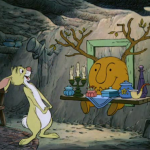 nonstop otherwise. Once we stop holding our breath in panic and resist that urge to gnaw off our own limb rather than face restraint in any form, a sense of calm acceptance takes over, new ideas and creative solutions bubble up from the silence, and the situation may appear totally different–less Pit of Despair and more Source of Revelation.
nonstop otherwise. Once we stop holding our breath in panic and resist that urge to gnaw off our own limb rather than face restraint in any form, a sense of calm acceptance takes over, new ideas and creative solutions bubble up from the silence, and the situation may appear totally different–less Pit of Despair and more Source of Revelation.
Could it be that when we feel the most “stuck” on land, our underground rivers are allowed to course freely, leading to wisdom and a depth of character we would have missed in our bustling path toward progress? If we sit still and surrender to the present situation for a minute, a day, a year, what might we learn?
I’m not saying we should give up or “settle.” The alternative to treading water is not to sink to a watery grave, but rather to float on your back for awhile. If we simmer down and sit with things when we’ve hit a wall spiritually, emotionally, or professionally, taking stock without the fight or flight reflex screaming in our ears, we might be surprised. Stuck can bring a startling peace. Being stuck can help us notice people or resources we had overlooked or dismissed in our flailing. It’s the truth that gets us unstuck, not striving or barreling or flailing. The truth. Oh, and sometimes tractors.

by bsquared5@aol.com | Jan 22, 2016 | Thoughts
“All the world’s a stage,” Shakespeare said in As You Like It, “and all the men and women merely players.” Maybe this explains why many of us feel like impostors. We may master the lingo, wear the uniform, even get the degree, but there’s always this feeling of looking over our shoulder, waiting for the men in black to bust in and rip off our disguise: “Aha! Just who do you think you are?” Back in the late 70’s, a pair of psychologists actually coined the term “impostor syndrome,” a persistent fear of being exposed as a fraud. Despite external evidence of competence, about 70% of us, particularly high-achieving women, remain convinced we are phonies.
In my first class in grad school, I remember looking around the conference table at my classmates, all of whom seemed intellectually superior, able to discuss literary theory as easily as last night’s sitcom. I did a lot of nodding and concurring, mastered pensive expressions, and all but took up pipe smoking in an effort to seem up to par. What I failed to realize is that half of them were doing the same thing.
Martha Beck recounts a fantastic anecdote in her book Expecting Adam. As a PhD student at Harvard, the bastion of intelligence, she once stopped in a friend’s lab and watched her performing a psychology experiment on some rats, monitoring them as they swam in a kiddie pool –a Smurf kiddie pool. When she gets to her next class a little late, she apologizes, “I’m sorry. I was in the Psych lab, watching rats swim around in a Smurf pool.” Not to be outdone by her, the instructor, a fellow student, and a visiting dignitary all pompously pipe up: “How’s Smurf’s work going?” “I read his last article.” “He’s had some remarkable findings.” The important thing–more important than being smart–is the prestige bestowed by appearing smart.
I once presented a paper to a room full of scientists at an environmental conference in Rome, Italy. I’d done the research, written the report, and polished the presentation until I could field any question, despite having had not one chemistry class in college. For twenty minutes at least, I was the expert and knew the material better than anyone else in the room. I would have been much more comfortable talking about themes in 18th century novels, but that wasn’t my job. Sheer fakery. But it worked out. I met some interesting people, and the research was well-received. I felt a little like Leo DiCaprio in Catch Me If You Can. Just carry a clipboard and you’re automatically in.
The other day my son questioned another parent’s behavior. I told him that she’d never had a teenaged son before and was just doing the best she could. No one gets a step-by-step manual for every parenting situation. At times, we are all flying by the seat of our pants. I remember leaving the hospital with my firstborn, flabbergasted that these people would just give her to us. Clearly, we were unprepared. Obviously, we had no idea what we were doing. I spent most of my kids’ childhoods feeling like an impostor, amazed that The Experts weren’t bursting in with video footage, eager to point to all the evidence of my screw-ups, mistakes, and fodder for their future therapy.
I toppled off the lofty parent pedestal a long time ago. My offspring are (all too) aware I’m not perfect and sometimes making it up as I go. Here’s the secret: we all are! We are all first-time, amateur humans winging it. No one is an expert, even if they’re carrying the clipboard. Fortunately, that allows for lots of teaching moments on forgiveness, grace, and how we learn from mistakes.
Unfortunately, feeling like a phony tends to limit the risks we’re willing to take. We’re so worried about being unveiled that we pull back–from opportunities, relationships, or dreams. If we are trapped by the “appear competent at all costs” lie, we keep our challenges–and consequently our victories–small.
Doesn’t it get tiring, this rationed life? So many of us are reined in, our potential and gifts spring-tight and begging for release, but we tiptoe obediently to avoid appearing foolish. A grace-filled life is abundant, not careful. We all have symphonies in us, waiting to be heard. How can we muffle the music because we might look silly? Disrobe, unmask, and go take a dip in the Smurf pool.
reined in, our potential and gifts spring-tight and begging for release, but we tiptoe obediently to avoid appearing foolish. A grace-filled life is abundant, not careful. We all have symphonies in us, waiting to be heard. How can we muffle the music because we might look silly? Disrobe, unmask, and go take a dip in the Smurf pool.
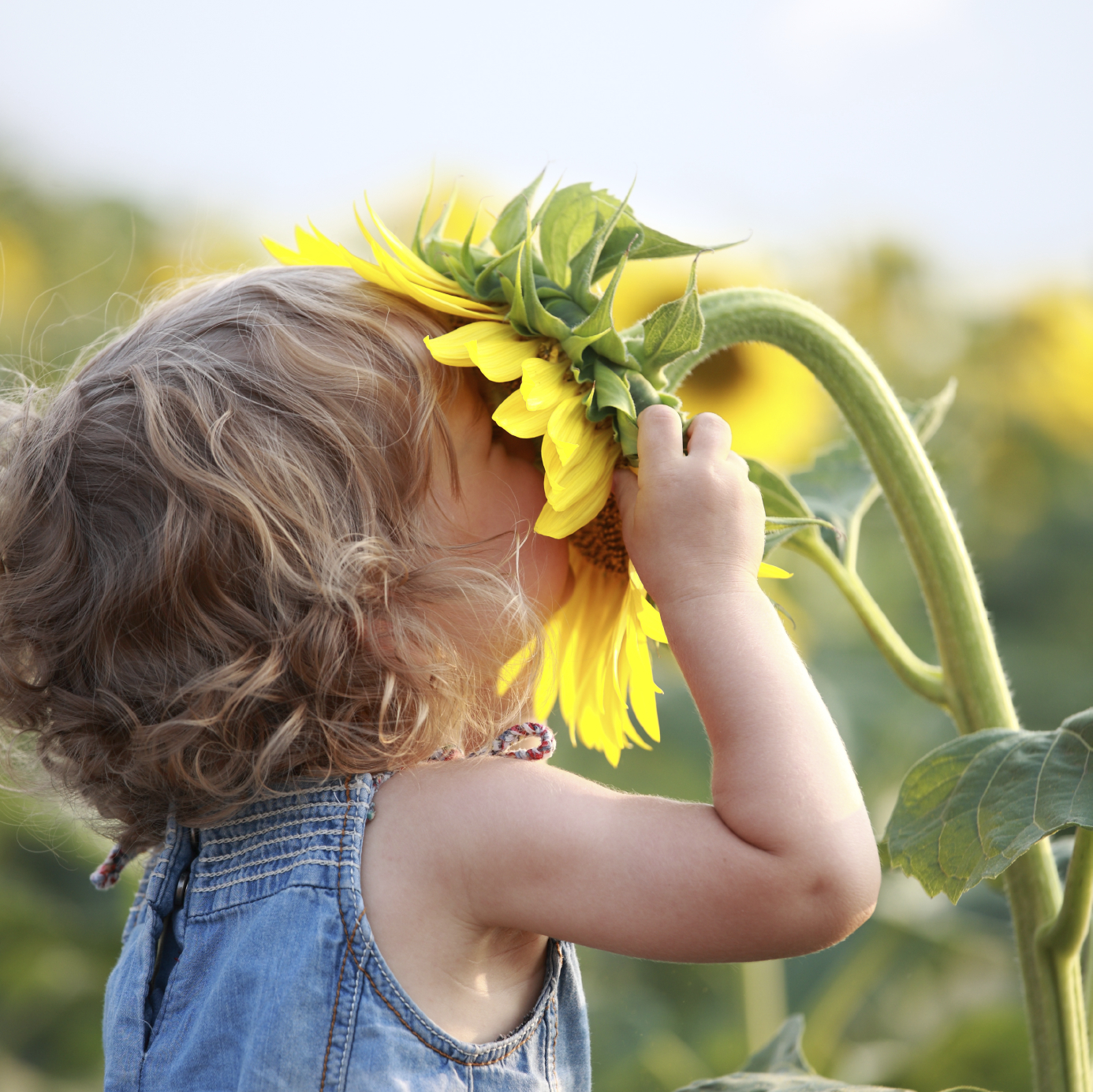
by bsquared5@aol.com | Jan 2, 2016 | Thoughts
It’s the second day of January. The carpet is still full of fallen pine needles, a straggler Christmas card just arrived in the mail, and the Christmas clearance section at Target is best described as “there appears to have been a struggle.” Two aisles over, cascades of pink and red hearts festoon the shelves. Valentine’s Day is 6 weeks away, yet the decor screams, “Let’s MOVE, people!”
2016 has barely begun and I’m already feeling the push of what’s next, hearing the faint scritch, scritch of anxiety scratching to be let in. Not this year. The 40’s have been described as the rush hour of life. We are busy with careers, tugged between growing children and aging parents, spread thin trying to maintain marriages, friendships, and waistlines. We run the treadmill, literally and figuratively, dealing with life in broad shallow strokes with little time to stop and dive deep.
My word for this year is savor. On Christmas morning, my sister’s family wakes gradually, enjoys a nice breakfast, and then opens presents one by one throughout the day. It’s not unusual for me to call late in the afternoon to wish them a Merry Christmas, asking if the kids liked what we sent. “Oh, we haven’t gotten to them yet!” she’ll say. “It’s not even dinner time!” I’m incredulous. At my house, we wake early, pillage the stockings, and whip through the bounty like Tasmanian devils. We are usually napping again shortly after lunch from the exhaustion of it all. This year, we reined in the frenzy and took our time, pausing to watch the pouring rain as it flooded the yard. It was a welcome change.
Maybe it’s a symptom of unfettered youth, this rushing on to what’s next. My ambitious and eager college student daughter is not even halfway through a semester before she’s planning the next. Every step is planned and scheduled, from semesters abroad to internships that may lead to post-graduation employment. She focuses on what’s around the corner, imagining life will be more exciting, stable, or less stressful when—. I tell her to slow down and enjoy where she is, but the truth is a couple of misty decades ago I did the same. I couldn’t wait to be an adult, unleashed and independent. I would have adventures and embark on a life that was, above all, interesting, the opposite of ordinary and everything I imagined my mother’s was. Life would start to be grand when I graduated, got a job, got married, once we had children, once they were out of diapers, once the business took off, once…
Now, a little further down the road, I see. The ordinary minutes of the ordinary days and years have blown by, consumed by something like 27,000 meals, 4,000 loads of laundry, and 14,000 diaper changes. Wiping the counters, feeding the pets, filling the gas tank, helping with school projects, taxiing to and from practices, church services, and friends’ houses. Teaching the littles how to write their names, ride a bike, drive. Reading The Seven Silly Eaters for the 85th time, wiping tears from scraped knees and broken hearts, gritting my teeth from a slammed door or the virtual door of headphones and a cellphone. Beach sand in our shoes, doctor visits, braces, and pet burials. Ordinary days. Not quite the world-changing adventure I’d imagined at 20, but an adventure, I think, just the same.
Truly, some of those days it was a struggle just to make it to the other side of morning. Many of them I wished for what was next because stories and diapers and teenaged angst were sometimes, honestly, less than riveting. Naptime, bedtime, date night. Now I just wish my mother were still here so I could tell her I get it. This is the adventure. This is the interesting. This was it all along. The sticky kisses, unshaven husband, car trouble, health scares, and bounced checks. Even the frustrations, hurry, and hurt. This is what my mother and my sweet friends who have left too soon no longer get to savor. This is what they clung so hard to and fought to stay for.
Savor means to taste and enjoy completely, which can only be done without hurry, without looking to the next bite before finishing the first. Always looking for what’s next, what we imagine to be our sav-i-or, reverses the natural order of things. It makes the foreground, the background, and we miss the gift of what’s now. If we deliberately, on purpose, slow down and take the “i” out of the equation, the “I” that worries and chafes, we are left with savor.
I no longer seek the elusive unicorn of what’s next, or better, or more exciting around the corner. Bob Marley’s “Every Little Thing Is Gonna Be Alright” is my current theme song. It’s the second day of January. Forget that vague holiday in February and enjoy today. May 2016 unveil your ordinary.

by bsquared5@aol.com | Dec 1, 2015 | Thoughts
My father brought me a cake of suet for Thanksgiving. He’d made it himself, a simple concoction of peanut butter, cornmeal, shortening, and flour. It hangs inside a square wire cage on a pole outside my kitchen window where I watch the birds feast as I wash the dishes.
I learned to take care of the birds from my grandfather, whom I stayed with one summer as a teenager. He took me with him as he strolled around his yard, refilling the various feeders: thistle for the goldfinches, sunflower seeds for the cardinals, jays, and chickadees, and a fruit and mealworm mixture for the woodpeckers and bluebirds. He would patiently mix sugar into warm water for the hummingbirds, and we’d watch them as they flitted and hovered by the sweet juice, their long tongues darting from their needle-like beaks as they drank.
In between doing chores for my grandmother and growing restless after idle hours spent reading, I’d head outside to find my grandfather dozing in the shade, a beer in one hand and a smoldering cigarette in the other. We would while away the afternoon as he taught me to notice the bird songs. I learned to focus and distill one from another, to cut out the background noise of neighbors mowing the lawn and dogs barking down the street. Although I couldn’t always see them, their songs gave them away. The high-pitched chip, chip, chip of the cardinal, the trill of the mockingbirds, the coarse clarion of the blue jays.
In the dusk of the evening, when the light grew too dim to distinguish their colors, he showed me how to recognize each type by its flight pattern, the distinctive swoop and dive of the mockingbird, the short scalloped lift and drop of the cardinal, or the gentle downward flutter of the mourning dove. Once, from the woods that lined the yard’s edge, we heard the muffled staccato hoo-hoo-hoo-HOO of a barn owl and seconds later watched as his shadow fell over the trees and everything in the woods fell silent.
My grandmother’s approach to the birds seemed less philosophical and more focused on portion control. Several trash cans full of seed lined their garage wall, but it was to be doled out only to the colorful songbirds. She hated the greedy purplish black starlings that descended in large flocks and scared away the less aggressive species. She’d sneer in contempt at their shameless effrontery, the feathered one-percenters. Worst of all were the persistent seed-grubbing squirrels. She worked herself into a tizzy, rapping on the kitchen window and yelling at them to scat as they robbed the feeders bare.
A friend of mine once had a brilliant African Gray parrot, which can have the average intelligence of a five-year-old child. Each morning, she’d pull back the shower curtain after her shower and open his cage door, saying, “Are you coming out of there, or what?” One morning, she apparently took a second longer toweling off before opening her curtain, and she heard his impatient voice ask, “Are you coming out of there, or what?” She stowed him under her seat on a flight once, and every time the captain came over the loudspeaker, the parrot would call out, “What?! What?!” causing fellow passengers to cast rude looks at her. The noise and speed of take off excited him so much he yelled at the top of his lungs, “Wowee! Wowee!!” before settling down once they were at cruising altitude, whereupon he sang the entire theme song to Green Acres. He was a rock star.
A bird like that with high intelligence and speech unnerves me; I imagine they must be plotting something. Plus, with the cats that already live here, there would be a constant rehash of all the Sylvester and Tweety episodes ever made, so we consequently never had a caged bird in residence. I am content to enjoy them from a distance, filling my own backyard feeders and setting up houses on fence posts.
Birds are everywhere–city parks, private gardens, forests, wetlands, rooftops, and windowsills. We are essentially surrounded by these wild animals and see them every day, but unless we live in Alaska and own a small dog that would make a delightful morsel for an eagle, we don’t fear them. About as different from us as a species can be, they are untethered to the land, minstrels in the trees, and give birth to eggs. Their bones are hollow and all but weightless, their abdomens are filled with air sacs, and their bodies are coated with soft colorful feathers.
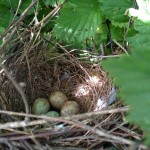 Despite or perhaps because of their differences, birds have been teaching me my whole life. My own backyard is a classroom.
Despite or perhaps because of their differences, birds have been teaching me my whole life. My own backyard is a classroom.
1. Create: Feather your nest. Look around and try to make even the mundane things beautiful. Use horse hair, Easter grass, or Christmas tinsel, but add some sparkle.
2. Have some common sense: My father told us about raising turkeys on their Wisconsin farm. Each year, several would drown because they’d stand out in the rain and look up.
3. Appreciate even small glimpses of beauty: In the woods around my parents’ house, we would often hear the elusive scarlet tanager singing, but it perched so high we rarely saw its blazing color. One of my mother’s greatest delights was spotting that unicorn every now and then.
4. Let loose every once in a while: During a hot, dry summer, after I water the azaleas outside my window, the birds congregate around the puddles and splash with abandon. Dance like no one’s watching.
5. Don’t get in fights you can’t win: Every spring, there’s a persistent cardinal who attacks his own reflection in the side mirror on my husband’s truck. This posturing and bravado goes on for days. The bird in the mirror never backs down.
6. Don’t worry: The sermon on the mount gets to the heart of the matter: look at the birds of the air; they do not sow or reap or store away in barns, and yet your heavenly Father feeds them. Who of you by worrying can add a single hour to his life?
7. Soar: Even though we’re grounded earthlings, we can still soar. Look up! Go for it! Take that leap of faith! You have to leave the safety of the nest sometime–it gets crowded in there.
8. Take care of the eggs: Give the littles all they need. Sit on them if necessary. Eventually, they will try their wings and figure out how to fly. (See #6).
9. When the cage door is open, fly: Don’t just sit there in bondage with your shiny mirrors and familiar perch! Are you coming out of there, or what?
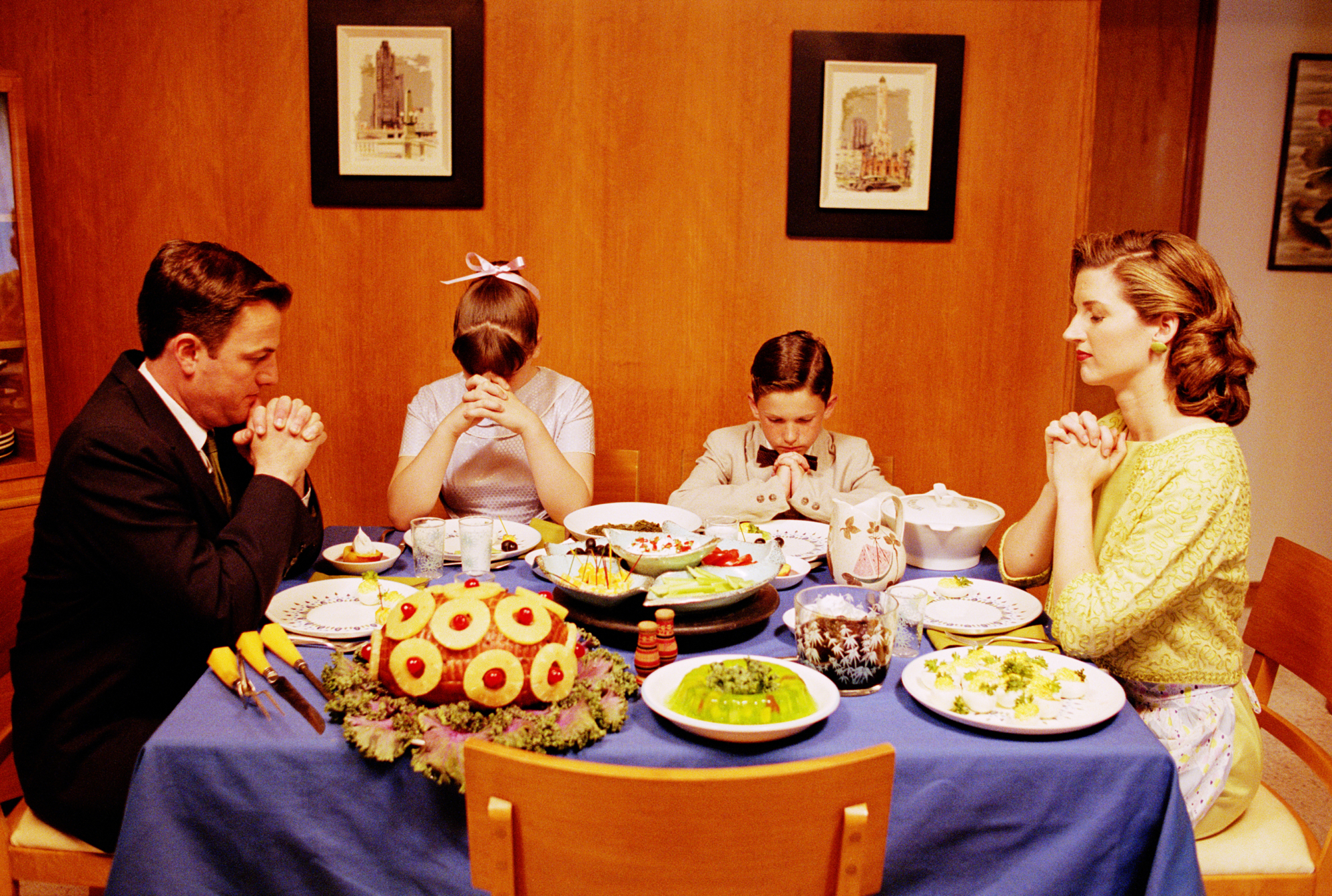
by bsquared5@aol.com | Nov 6, 2015 | Thoughts
I am no gymnast; however, being a product of a dyed-in-the-wool Southern girl and a staunch and proper northerner sometimes stretches me into doing the splits across the Mason-Dixon Line.
It’s a scant 3 weeks til Thanksgiving, which reminds me of the strange and serious divide we used to live as kids. After driving over the river and through the woods, whichever grandparents’ house we landed at for the holiday made for an entirely different Thanksgiving.
If we headed north, up to Pennsylvania, the big bird would be full of something called stuffing, kind of a wet and sticky bread concoction that was baked inside the turkey. Getting it inside there called for sticking a hand into the bird’s empty, raw cavity and spooning it in. This is probably how the unfortunate turducken was invented: some squeamish fellow could no longer stomach the stuffing process and sent other lesser birds in one after the other until the turkey could hold no more. The northern table boasted a bowl of cranberry sauce, with round juicy cranberries chunked throughout; long, thin string beans, the French kind, and mashed potatoes and gravy.
If we headed south, to Florida, the bird would be empty, its neck would be boiling in a pot on the stove, and in the oven would be a pan of dressing, made of skillet cornbread, broth from that boiled neck, and dotted with butter. It would emerge golden and crispy on the outside and creamy on the inside, with just the right amount of sage. Cranberry sauce on the southern table would have been a matter of opening a can at both ends and schlopping it onto a plate so it maintained its can shape, which is how cranberries appear in nature. Flat, bacon-flavored green beans would have come from a jar canned from the summer garden’s bounty.
At our house, while the turkey slowly roasted, my mother would steal bits from that boiling turkey neck and eat the gizzards, too, parts my northern kin threw away. No doubt this impulse goes back to that scene in Gone With the Wind, when Scarlett O’Hara rises from the ground, her fist in the air, vowing to never be hungry again. In the South, when your Boogeyman is Sherman and the war of northern aggression, you eat everything.
Then there was grace. At the northern table, we bowed our heads, performed the sign of the cross in unison (all, except my mother), and recited together:
“Bless a Solard, For these Thigh giffs, Which we our battery sieve, From thy bow’d knee, Through Cry Solard, Amen.”
Or at least that’s how it sounded to my childish ears. Eventually, I learned it was more than gibberish: “Bless us, Oh Lord, for these Thy gifts, which we are about to receive, from Thy bounty. Through Christ, our Lord, Amen.”
At the southern table, we didn’t say grace. When my grandfather reached for the biscuits, that was the cue to dig in. Grace was my grandmother’s pride in her cooking, and the hushed quiet that fell over the table as everyone savored each bite. I half wondered, as a kid, if maybe the southern grandmother’s cooking didn’t require as much insurance, coming mostly straight from the garden, which was somehow closer to God than shelved cans from the A&P.
My own little family has now been diluted to only 1/4 northern, and our Thanksgivings are decidedly of the southern ilk. My father-in-law is the official sage tester for the dressing, taking one for the team and facing salmonella every year as he repeatedly tastes the dressing as his wife prepares it, despite the raw eggs. We say a grace that is less recitation and more wandering conversation with our Provider. When my father is there, he listens silently and finishes with his solo sign of the cross, while my decidedly un-Catholic in-laws pretend not to notice so he’s not uncomfortable.
For awhile, after my parents eloped, it was a bit like the Capulet’s and Montague’s. Their union was a convergence of two rivers, the upheaval in the middle sometimes a Bermuda Triangle. It took time for the bristling and resentment to die down. Probably all families are like that, some. We can be contemptuous and jealous, whining petty brats. Three ring circuses of dysfunction.
So when we can sit together without waving flags or firing shots and take a bite of forgiveness or swallow a bit of pride, we say grace to each other. When we can count a few blessings, appreciate who’s no longer there around the table and be grateful for who we’ve still got, even though a little bit of their crazy is showing, grace abounds. They’re silently thinking the same about you (*wink, wink*).
If you can pause for a moment of gratitude before the shoveling ensues, savor it. Savor your abundance of family and food. Laugh out loud in delight if you need to at the patchwork of loopy, messy souls that have your back, some of whom seem to be trying to be hysterical for a living. God bless ’em. Amazing grace.












